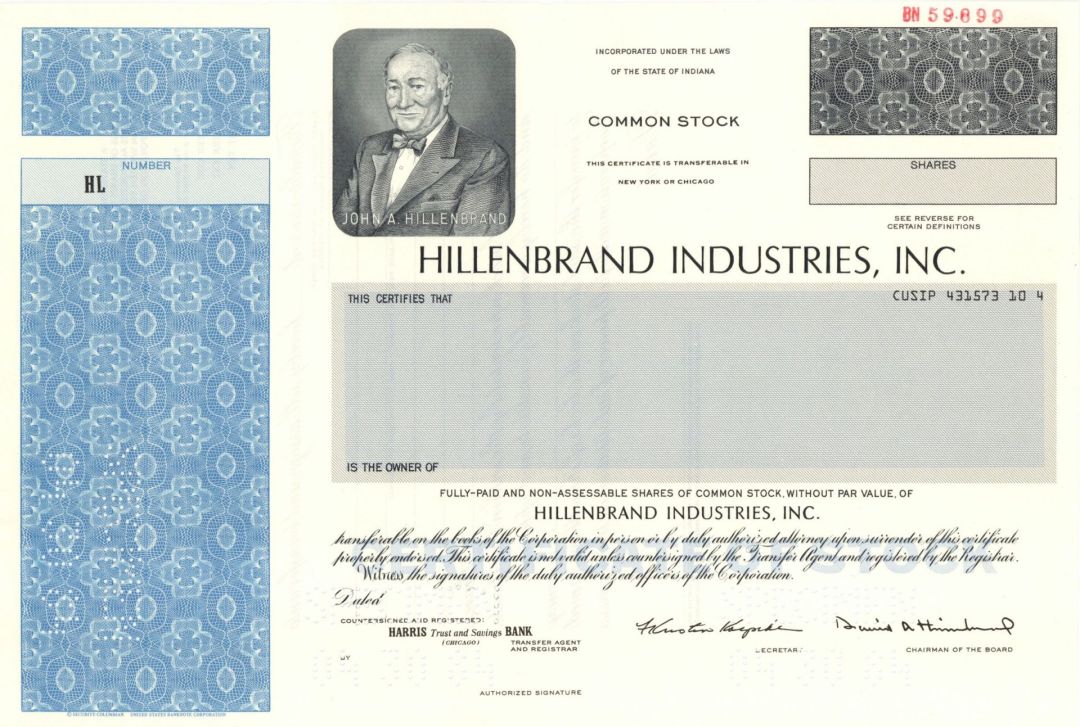Hillenbrand Industries, Inc. - Specimen Stock Certificate
Inv# SE3757 Specimen StockIndiana
New York
Specimen Stock printed by Security-Columbian United States Banknote Corporation.
Hillenbrand Industries, Inc. is a holding company for two major operating businesses, Batesville Casket Company and Hill-Rom Company. Batesville Casket manufactures caskets and cremation-related products, selling its products to funeral homes in North America, the United Kingdom, Australia, Mexico, and Puerto Rico. The company ranks as the largest coffin manufacturer in the United States, controlling nearly half of the domestic market. Hill-Rom operates in the healthcare industry, selling and renting hospital beds, furnishings and accessories, and systems for wound, pulmonary, and circulatory care. "The first generation starts a company, the second builds it, and the third generation destroys it," recalled August (Gus) Hillenbrand, president and CEO of Hillenbrand Industries, in the Cincinnati Business Courier in 1993. A family friend had offered those words in jest to Hillenbrand when he was boy. "That has just stuck with me all my life ⦠and that's why we work so dang hard." Indeed, in the mid-1990s Hillenbrand was sustaining a legacy of success which his grandfather, John A. Hillenbrand, initiated in the late 1800s. John A. Hillenbrand's father, a German immigrant and woodworker, settled in the German-speaking community of Cincinnati, Ohio, before the Civil War. He was soon drawn, however, to the enormous timber stocks of southeastern Indiana. Shortly after moving to Batesville, Indiana, in 1861, the 16-year-old Hillenbrand found himself orphaned with two infant sisters. Realizing that timberland was abundant and inexpensive in comparison to farmland, he abandoned his family's unprofitable farm and began purchasing small sections of woodland. He cut and sold the rich hardwood to the railroads for track ties, and then sold the cleared land to farmers. Like his father, John A. Hillenbrand combined hard work and ingenuity to create several Hillenbrand family enterprises, including a general store. In 1906, Hillenbrand seized an opportunity to rescue the Batesville Coffin Company, a local casket manufacturer founded in 1884, from bankruptcy. He employed German woodworkers, carvers, and cabinet makers to craft his high quality coffins, and used his business acumen to turn the company around. Steady coffin demand, a swelling population, and Hillenbrand's success at increasing his share of the regional casket market allowed the company to realize healthy profit growth throughout the early 20th century. Part of John A. Hillenbrand's unique recipe for success was close cooperation with his four talented sons. For example, John W., the eldest son, eventually assumed his father's role as president, and guided company expansion during the mid-20th century. George C. became the company's manufacturing genius. His numerous patents and his insistence on continuous product improvement made innovation a Hillenbrand hallmark. Daniel A., the youngest son, is credited with extending the company's reach nationally and, during the late 20th century, globally. William A., the second oldest son, vastly broadened the scope of the Hillenbrand operations into the healthcare field. In an attempt to start a furniture business, he founded the Hill-Rom Company in 1929, during the Great Depression. Determined to set himself apart from other furniture makers, William decided to enter the hospital market. He spent almost a full year visiting hospitals throughout the United States to determine how he could improve furniture in patient's rooms. The end result was his development of the first wood and metal hospital bed, which soon replaced the prevailing white tubular steel beds. Read more at https://www.encyclopedia.com/social-sciences-and-law/economics-business-and-labor/businesses-and-occupations/hillenbrand-industries-inc
Stock and Bond Specimens are made and usually retained by a printer as a record of the contract with a client, generally with manuscript contract notes such as the quantity printed. Specimens are sometimes produced for use by the printing company's sales team as examples of the firms products. These are usually marked "Specimen" and have no serial numbers.











Ebay ID: labarre_galleries